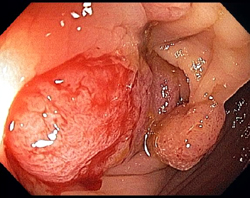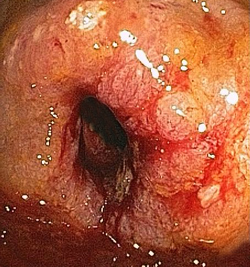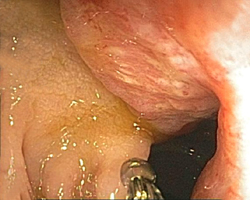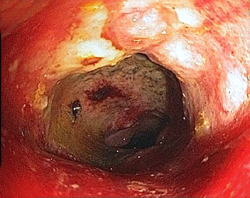Colon cancer is one of the few types of cancer that usually does not produce symptoms until the later stages. We perform screening colonoscopies to find colon cancer early since it may not produce problems until it is rather advanced. One of the earliest symptoms of colon cancer is bright red bleeding with bowel movments. A common misconception is that colon cancer produces dark blood. Colon cancer is more likely to produce bright red bleeding.

This is a picture of colon cancer with active bleeding. Notice that the blood is bright red and not dark. Darker blood is more representative of blood from the stomach or small intestine. This is due to the fact that it becomes partially digested before it reaches the colon and produces the dark color.
Other common symptoms of colon cancer include abdominal cramping, a feeling that your bowels do not empty completely, and a change in the consistency or size of your bowel movements.

This is a picture of colon cancer which has grown completely around the inside of the colon. Notice that the opening of the colon is now very small. This colon cancer produced symptoms of abdominal cramping and a change in the size of the person's bowel movements. Abdominal cramping was caused as stool passed through this area with difficulty. The person also experienced occasional bright red bleeding with more difficult bowel movements.
Colon cancer can also produce diarrhea by inhibiting the colon's ability to absorb water out of the stool. This can result in frequent, loose, and sometimes watery bowel movements.

This is a picture of colon cancer which was causing excessive diarrhea. The person experienced frequent diarrhea with an urge to use the bathroom unexpectedly.
Colon cancer may also produce weakness, fatigue and unexplained weight loss. These symptoms may not occur until the latest stages.

This is a picture of colon cancer which was bleeding constantly every day. The person was experiencing weakness and fatigue from the excessive loss of blood. The person also had lost weight due to the fact that the colon cancer had spread throughout the body.
If colon cancer is found and treated before these symptoms develop, the opportunity to cure is 95% or better. For this reason it is advised that everyone have a screening colonoscopy at 50 years of age . For people with a relative with colon cancer, it is recommended to have a screening colonoscopy at 40 years of age.
